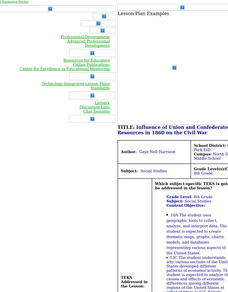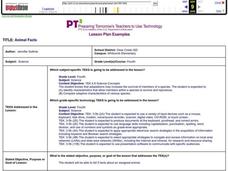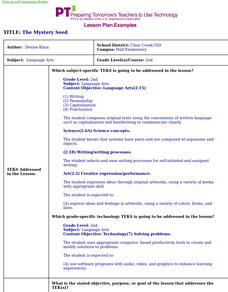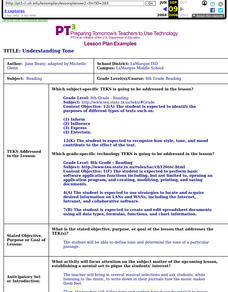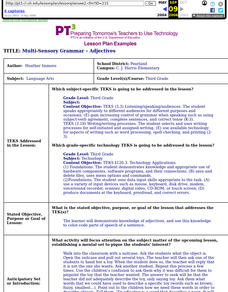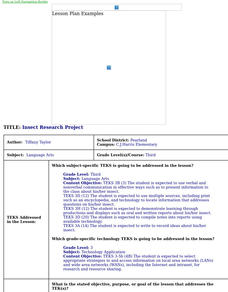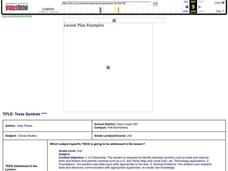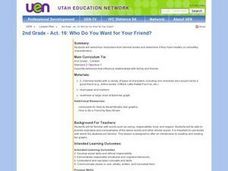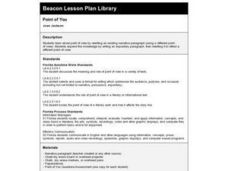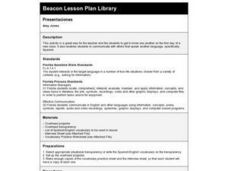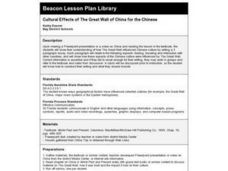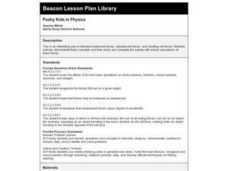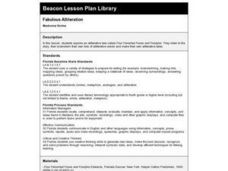Curated OER
States
Second graders look up their assigned states on the internet, cut and paste pictures on word document, and print out the pictures.
Curated OER
Influence of Union and Confederate Resources in 1860 on the Civil War
Eighth graders compare/contrast population, railroad mileage, manufacturing plants, and industrial workers between the Union and Confederate States in 1860; students analyze effects of the resources of the Union and Confederate Forces on...
Curated OER
Texas Symbols
First graders create 2 Texas State symbols using Microsoft Paint and identify 4 Texas symbols. Each student get to choose his/her own symbol to draw. Each child have a workbook with the symbols in it. The final products are made into a...
Curated OER
Animal Facts
Fourth graders list five facts about an assigned animal, and complete a bird beak activity, using pliers, blunt pencils, forceps, clothespins, and a spoon that represent different types of beaks; students complete chart showing best type...
Curated OER
The Mystery Seed
Second graders create a short descriptive story describing a mystery seed they have planted. They incorporate needs that must be met in their story for a seed to grow. They create an original picture using the Kid Pix software program.
Curated OER
Understanding Tone
Eighth graders define tone and determine the tone of a particular passage making a web of tone words on Inspiration. They write a journal entry expressing how a piece of music makes them feel and create a PowerPoint to share.
Curated OER
Native American Indians
Fourth graders identify Native-American groups in Texas before European exploration and describe the regions in which they lived. They list Native American Indian tribes from Texas, describe them, and evaluate how the environment...
Curated OER
Spiders - KidPix
Students answer questions after a story is read aloud, identify and recall the three major body parts of a spider (head, body and 8 legs), construct a spider when given parts of a spider on a handout, and draw and decorate a spider using...
Curated OER
Multi-Sensory Grammar - Adjectives
Third graders demonstrate knowledge of adjectives, and use this knowledge to color-code parts of speech of a sentence.
Curated OER
Insect Research Project
Third graders research information about their specific insect on the computer, and use the information that they have compiled about their insect to create a power point presentation.
Curated OER
Texas Symbols
Second graders identify the Texas symbols, collect information from the Internet about one of the state's symbols, and present the information they collected in KidPix. Can be adapted to any state.
Curated OER
Greek culture and Aesop's Fables
Tenth graders explain political and social thought during the Greek 6th and 5th centuries B.C. They research five to eight fables, figuring out the moral for each and writing an essay on how Aesop influenced the morals and ideals of...
Curated OER
Who Do You Want For Your Friend?
Second graders create a t-chart about the healthy and unhealthy characteristics in relationships. They discuss elements they should look for in a friend. They are read books to identify these elements.
Curated OER
The Anasazi
Students investigate and determine the origins of the ancient Anasazi who inhabited present-day Utah and the Four-Corners-Region.
Curated OER
Point of You
Sixth graders study point of view by rewriting an existing narrative paragraph (using a different point-of-view). They expand this knowledge by writing an expository paragraph, then rewriting it to reflect a different point-of-view.
Curated OER
Presentaciones
Fourth graders use five minutes to interview each other in Spanish and fill in their worksheet. At the end, 4th graders, in pairs, present each other in Spanish to the class.
Curated OER
Cultural Effects of The Great Wall of China for the Chinese
Sixth graders write a three paragraph essay describing how three areas of their culture were affected by The Great Wall of China.
Curated OER
Pushy Kids in Physics
Students examine the concepts of balanced forces, unbalanced forces, and resulting net forces. They participate in a force and motion demonstration by pushing students in various directions, and calculating and identifying the resulting...
Curated OER
Their Eyes are Watching
Fourth graders create a character map for each character in the novel, adding to each as he or she is revealed in "Their Eyes Were Watching God." They document how each character deals with attitudes and injustices.
Curated OER
Sneetches by Dr. Seuss
Students read "Sneetches" by Dr. Seuss. They complete a story map and write about the topic of prejudice. They role-play star-bellied and plain-bellied sneetches and write a persuasive essay about their experiences.
Curated OER
Fabulous Alliteration
Fourth graders explore an alliterative tale called Four Fanished Foxes and Fosdyke. They listen to the story, then brainstorm their own lists of alliterative words and make their own alliterative tales. Some nice worksheets are attached...
Curated OER
In My Dream
Students listen to recordings of early jazz and identify examples of ostinato and syncopation. They discuss important personalities from jazz cultures and take a quiz on aspects of jazz.



